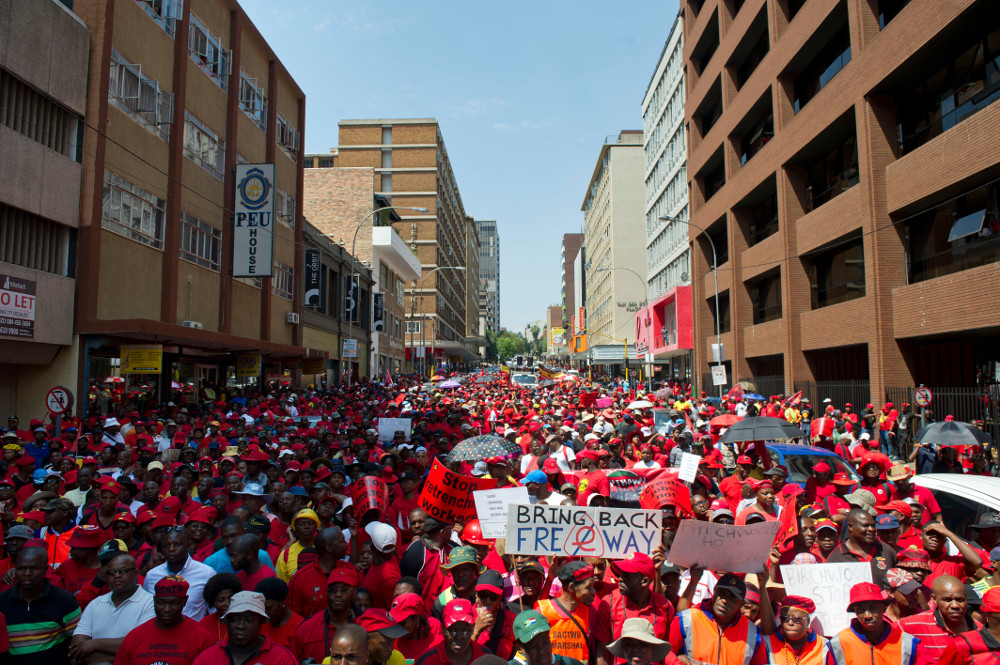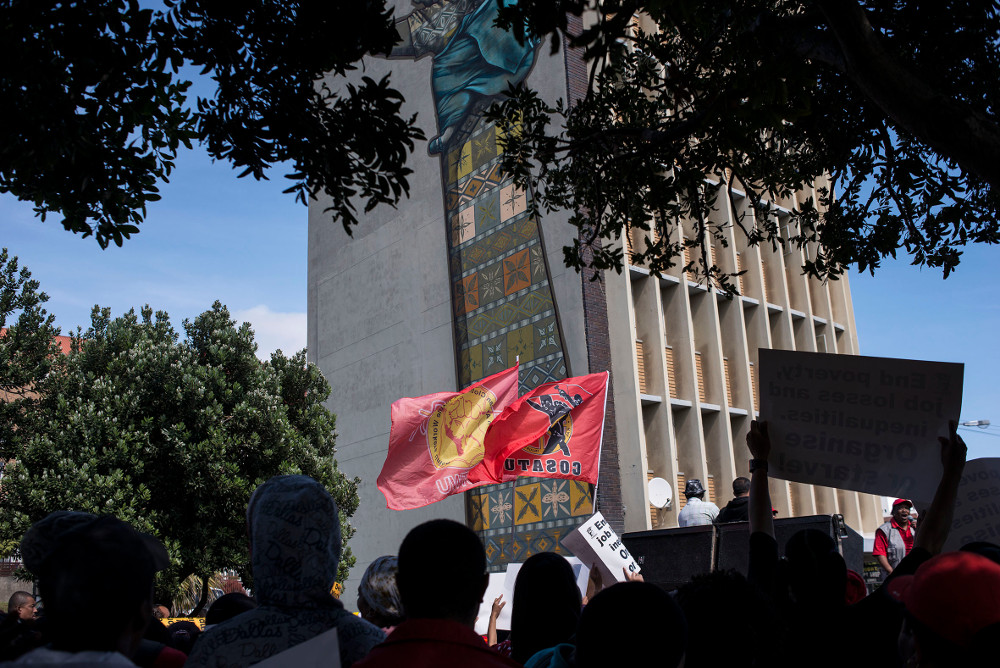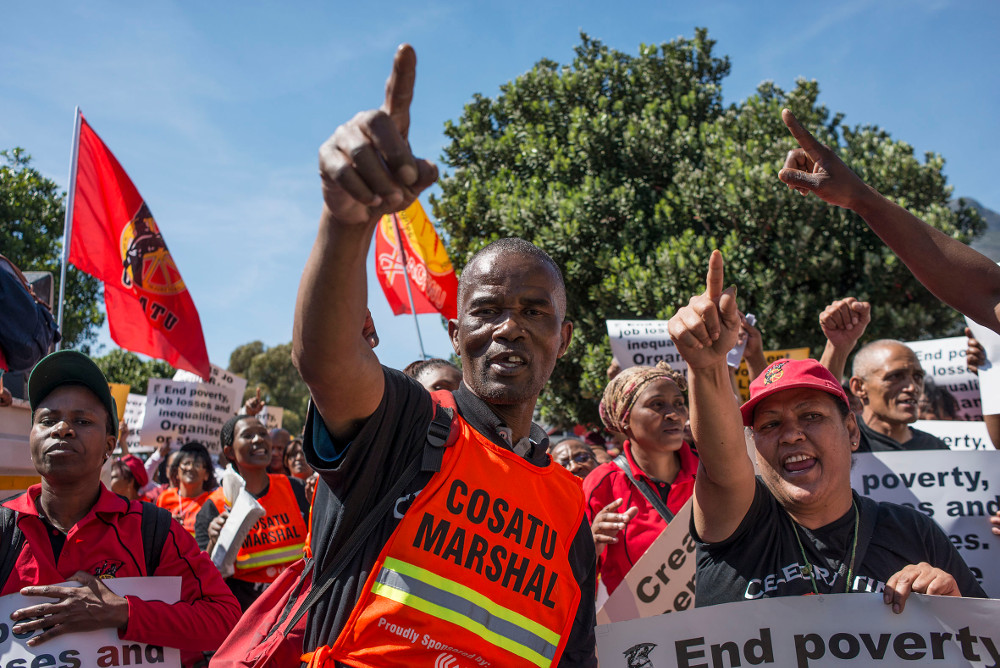Thousands of people, most of them clad in red T-shirts, braved the sweltering Highveld heat to march through the Johannesburg city centre in support of Cosatu’s call for a nationwide, multi-sector strike.
Among other reasons, the workers marched for decent jobs, an end to retrenchments and the scrapping of the controversial e-tolls on World Day for Decent Work.
The workers handed memorandums to FNB Bankcity, Gauteng Premier David Makhura’s office and the Chamber of Mines. The socioeconomic march was protected by the National Economic Development and Labour Council (Nedlac).
At Bankcity, Cosatu bemoaned foreign ownership in the banking sector, saying this would result in capital flight. They cited Barclays Bank’s ownership of Absa as well as Industrial and Commercial Bank of China’s 20% stake in Standard Bank.

The Cosatu march in Johannesburg’s city centre. (Delwyn Verasamy, M&G)
By Wednesday afternoon, none of the business bodies had commented on the economic impact of the strike.
Nedlac has given the National Union of Metalworkers of South Africa (Numsa) permission to march against corruption on October 14.
Free Market Foundation executive director Leon Louw said on Wednesday that while the foundation supported the actions Cosatu took on behalf of its members, the federation’s demands would make it more difficult for the unemployed to get jobs.
If the cost, risk and difficulty of employing people was higher, people whose productive capacity was less than the threshold could not be employed. That includes unskilled, elderly and youth, more than half of whom have never had a job and are denied learning on-the-job skills, according to Louw.
He said Cosatu’s demands could drive small businesses out of business.
“It would normally not be necessary to ask a trade union to consider the interests of non-members, but with our extreme crisis of low growth, the world’s highest level of sustained unemployment, rising inequality and unsustainable poverty, we implore Cosatu to keep demands and expectations within reasonable limits,” said Louw.
“We know that is counterintuitive for a union federation, and we know they have to make strident demands to combat threats from rival unions, but the country is in such a dire crisis that Cosatu should rise above narrow interests in the greater national interest.”
Tax the rich
In Cape Town, Cosatu provincial general secretary Tony Ehrenreich had strong words for government and higher income groups as union members marched to Parliament.
“We want them to tax the people who live in Clifton and Sea Point,” he said, adding that workers should be exempt. “Unemployment and poverty in this country is a tax on poor people … We have to feed our brothers, our grandparents and our family when they are unemployed,” he told the crowd outside Parliament.
“The white people have great public transport, but our people suffer the most.
“In our shops, they now want to move value added tax from 14% to 17%. We want higher tax, but not the taxing of our workers.”

The march in Cape Town. (Photos: David Harrison, M&G)
Around 1 000 people joined Cosatu in the relatively peaceful march through Cape Town’s city centre. They were joined by numerous members of the trade union’s provincial and national branches, as well as the South African Communist Party’s Thulas Nxesi, who addressed the crowd.
Ehrenreich handed the trade union’s new workers’ demands to a representative from the ministry of transport at the end of the march.
Cosatu was joined by members from Numsa, the South African Clothing and Textile Workers Union and members of the South African Students Congress.
Cosatu stated its demands in its Memorandum for Integrated Public Transport.
Ehrenreich suggested that there existed a viable solution that would help working-class people of the country lower their transport costs. “We want to make sure that there’s an end to e-tolls, and we want a better public transport system.

Workers want jobs and an end to poverty.
“Some people spend half their wages from jobs just to get from the outskirts of the city to the city centre. And they didn’t choose to live there; they were forced there by apartheid,” he said.
Cosatu’s demands included a moratorium on all retrenchments in all sectors while parties looked for sustainable solutions, as well as the introduction of progressive taxations, including a wealth tax.
The trade union demanded a national minimum wage be set to avoid “super exploitation”.
Other demands included:
- A call for government to release a white paper on national health insurance and urgent attention to be paid to the current healthcare system
- A secured energy/electricity supply for households, economic growth and job creation
- A rejection of a youth employment tax incentive.
“We are building this economy and we must celebrate that. But when things are wrong, we must challenge that,” Ehrenreich concluded. At this point, he called on a representative of Transport Minister Dipuo Peters and Cosatu national treasurer Freda Oosthuysen to co-sign the Cosatu memorandum.
“I am so tempted to join in the song. On behalf of the minister of transport, we accept the memorandum,” the transport minister’s representative said. “We appreciate the discipline you have displayed and we hope you can portray that same discipline as you go back to your homes and workplaces.” – News24.com